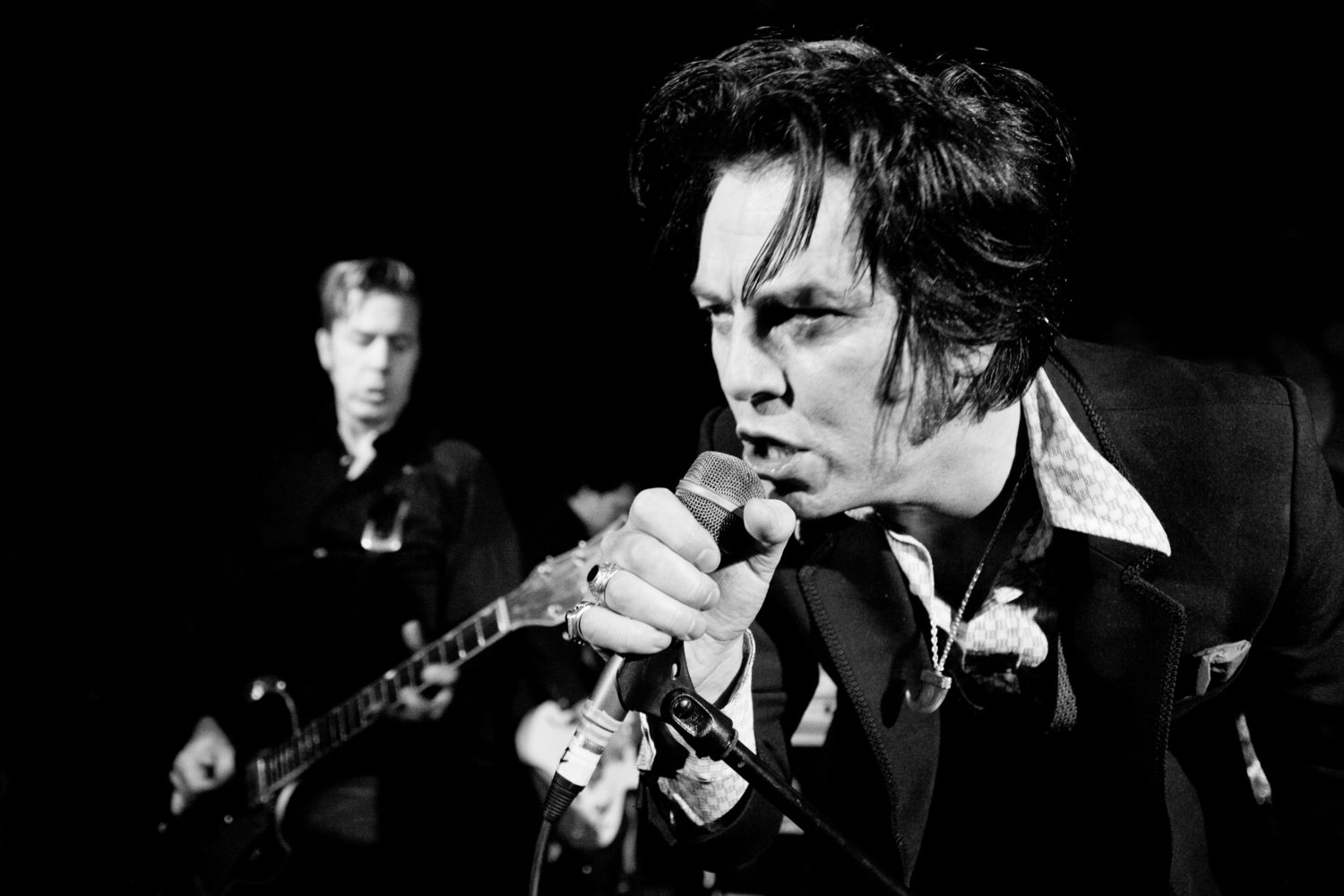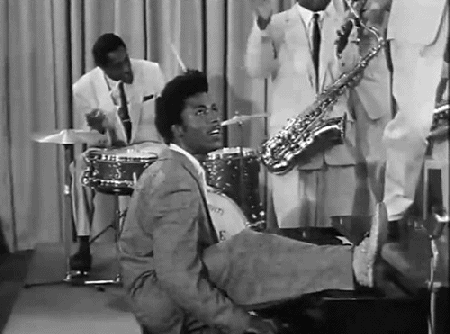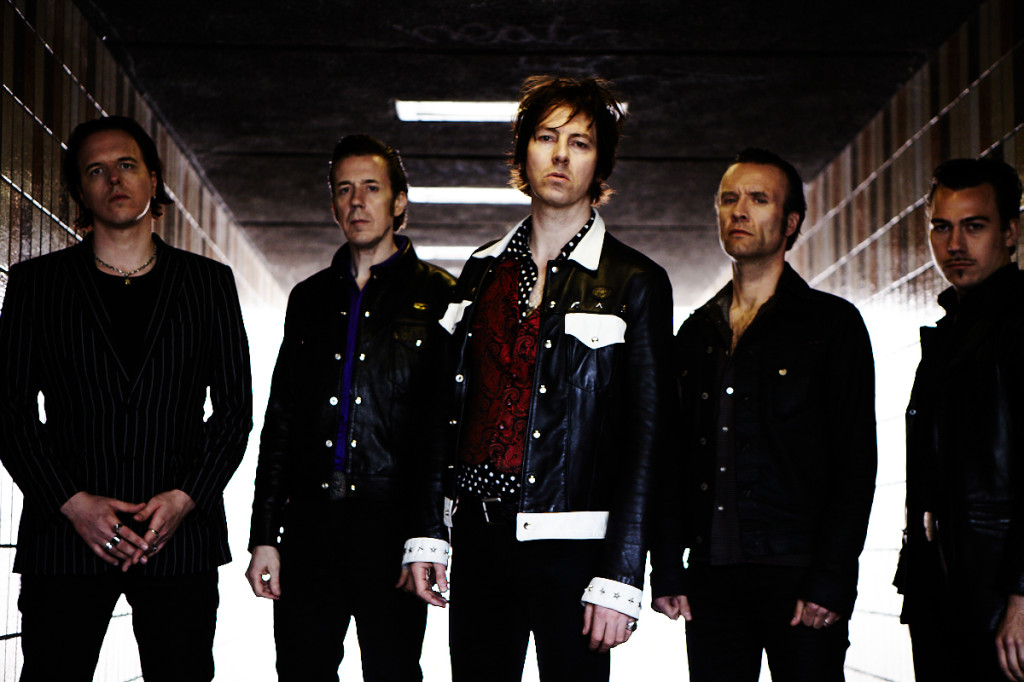
Photo credit: Buzz magazine
Sharks have been the same since they showed up in the ocean a half billion years ago. Sleek, muscular, every inch a weapon with singular purpose. While other ocean dwellers have adopted bright colors or pack mentalities or inventive methods of reproduction, a shark today is essentially the same as a shark a half-billion years ago. Maybe a bit meaner.
The Jim Jones Revue treats their music like a shark, their speaker-peaking serenades bearing the instantly recognizable profile of the genre’s progenitors (Berry, Richard, Presley) from the first 30 seconds of their eponymous 2008 debut. Sparing no savagery in the act of paring away a half century of neutered navel-gazing from the oft-declared-deceased skeleton of Rock and Roll, they delivered on the infernal titular promise of 2010’s Burning Your House Down with another half-hour of piano-backed punk rock blues. Both releases showcase an unabashed enthusiasm for, and familiarity with, the primordial R&B pool that Bill Haley & the Comets slithered from, while their unrelenting attack distinguished them from any limp “Good-Ole-Days” rockabilly revival.
Then, 2012’s The Savage Heart. With new pianist Henri Herbert the JJR took a sharp left turn and demonstrated a range of emotion that could be jarring to a listener accustomed to the blistering sound of previous albums. The tarot-esque archetypes dealt with in the songs (“The Wronged Man,” “The Feminine Force of Nature,” “The Power of Rock”) had shrouded the singer, but the vulnerability on tracks like the guitar-less “7 Times Around the Sun” and waltzing “Midnight Oceans & the Savage Heart” only deepened the mystery.
Eager to deconstruct both singer and song so I could steal the component parts for my own purposes, I was able to interview lead singer Jim Jones at Webster Hall just before the group played the launch party for Paul Pope’s Escapo and finally get some secrets right from the man himself.
Mike Pfeiffer: So I gotta say, I’m a huge fan.
Jim Jones: Oh, well don’t gush.
MP: Alright just one–I literally melted your first CD in my old car.
[Here I withdrew my supremely nerdy sheet of questions from my blazer pocket.]
MP: So you have, like, the most grinding voice in rock. It’s nuts. I can barely sing along without hurting myself. What’s the secret to doing that every day?
JJ: You gotta be careful. I gotta watch it with dairy, it sort of clogs it all up. The singer’s enemy is phlegm. Whatever you have to do to keep that at bay. But you get used to it, too! When this band started I used to smoke, drink a lot–I quit smoking. I was able to stay quit because it made a difference. I find with most addictions if you’ve got a good enough reason you can master them. But even then we’d do three days on, three days off–now I’m used to it.
MP: Your touring schedule is so intense, too. It’s literally every night.
JJ: Yeah, play every day. Which is okay, what makes it hard is that go-to-bed-late-get-up-early-drive-for-sixteen-hours-
MP: –And it’s all dry air conditioning tearing your throat out–
JJ: -Flights are awful. In some earlier bands we had this guy who had all these weird ideas for how to cure things. “For a sore throat, take a cigar, put it in a glass of water, leave it by the side of your bed and in the morning drink the whole lot down. You’ll vomit for about an hour and then you’re fine.”
MP: Did it work?
JJ: Fortunately [knocks floor] never had to use it, but I’ve got it in my back pocket.
MP: So I noticed you guys are especially always touring in France, way more than other bands.
JJ: France, they love us. And…they pay us.
MP: Why are you so popular there? Any ideas?
JJ: They embraced what we were doing, even before England. It was mad. We’d do little club shows in England and we’d go over to France in our little splitter van and put up on site among these big nightliners and play these 35,000 person festivals. I don’t know, maybe it’s part of the French makeup. If they don’t like something they protest or cut your head off with a guillotine, haha. I feel like rock and roll goes with that whole kind of viva independence attitude. They took to us.
MP: Okay, so I had to ask about the voice thing because I feel like I keep finding out that my heroes are Vegans? Joan Jett, Justin Hawkins–they gave a bunch of stuff up and now they’re belting on stage like it’s in the studio.
JJ: Well if you’re in a hobby band playing once a month at your local venue you can order in a couple of grams of coke and a couple of bottles of whiskey with your buddies and make a weekend of it and that’s fun. [Hey kids, don’t do coke. –Dylan The Editor.] But if you’re playing every day you can’t really do that. You can’t expect to give a great show every night if you’re hammering it.
MP: Definitely, I was struck by the professionalism you guys have in your show. Down to the way you guys make sure everyone’s got the same look and stuff.
JJ: We don’t force it. We’re just lucky enough to be on the same page about what we think this thing should be. We’ve been doing it for a few years; when you’re with people you just grow together in a certain direction. It’s weird because we got together and none of us really knew each other, and we were just really lucky that it had a chemistry I got the thing together as an experiment. I was having a Little Richard moment, kind of a renaissance going back to these records I had heard as a youngster growing up and kind of realizing they were the blueprint for everything else.
MP: Yes! I’m a huge Little Richard fan, it’s crazy how he like…can’t be covered. You can speed it up, you can try and play it louder but you’ll never make it sound wilder.
JJ: In the pocket in all the right ways. This screaming gay black man in New Orleans in the racism of the 1950’s, he had a lot of balls just being him. A lot of Little Richard is that it’s just him.
MP: Like it’s the only way he can really express himself.
JJ: He’s putting on a show but most of what you love is who he is. I wanted to try and play a couple of those songs, master that…like you say it’s got all this attack to it but it’s got this beautiful swing, this sexy thing. The first time we ever played together we were like “Woah. I think we’ve kind of got a tiger by the tail, here.” We’ve been riding it ever since.
MP: Where’d your stage persona come from? Like a…Mick Jagger preacher. Is it the same across your other bands or did you have to change it up?
JJ: It’s kind of all the things I’ve liked through the years. A culmination of all that, you do your best to try and make it your own. It’s very hard, going back to the music–with rock ‘n roll it’s such a well known genre that trying to make something of your own is really hard. And as you’re working to try and come up with new ways to express it you stumble across all these other things it’s like “oh that sounds good… wait, that’s kind of what AC/DC did. Hm. Let me try something else… Oh that’s the MC5 way. That’s Motörhead.” All these kinds of same mechanisms that people use to keep the rock ‘n roll spirit and make it their own. And you’re left with fairly slim pickings! And there are a lot of great bands that have taken elements out of that to make it their own, so you’re not just trying to not sound like the originals, you’re trying not to sound like everyone after that.
MP: That’s one of the things I think worked about The Savage Heart. It was this stuff that threw curveballs, like the tracks without guitars and stuff and felt way more like a risk because it was much more personal, making it your own in a way we hadn’t seen on the other albums. It made me want to ask, how much of those love songs are archetypes and how much is autobiographical?
JJ: It has to come from you. And then you’ve got to mess with it to the point that you’re comfortable to say it. Some people are great, they can just come straight out and say what happened that’s bothering them. But for me the things that actually happened to you aren’t as important as how you feel when they happened. You try to express the emotion of the event rather than the event. There doesn’t seem any point trying to do that, it’s a subjective animal. Hopefully people can project their own ideas onto it. I think it’s important not to make a tune too obvious about what it’s supposed to be, you’ve got to leave room. Shakespeare used to have his murder scenes offstage because he knew the audience would project something more powerful to them onto something they couldn’t see. With all music you gotta do that, not be too obvious. People aren’t stupid, you don’t need to lead them.
MP: You guys are working on a new album right now, right?
JJ: We’ve been trying, between our touring schedule, working on songs, seeing how far we can take it and make it more individual.
MP: Do you have any new genres or artists you checked out since the last album that’s leading it? The single, “Collision Boogie,” has a New Orleans sounds to it, you dropped the guitar again…
JJ: It’s funny, there’s not that much “new” as much as it’s about tapping into yourself and going deeper and deeper to see what’s in there. I’ve listened to new things but there isn’t that much that stuns me as much as stuff I’ve already heard so it’s more a process of digging inwards and it’s bottomless. But not all of it is useful. “Oh, I’ve found a really big thing! But it’s absolutely no use.” Just getting down between our selves and seeing what we can dredge up.
MP: I feel like Henri, the new piano player, changed so much.
JJ: He came at a time when we were trying to push further out. He’s got a whole catalogue of styles, a lot of them are so antiquated you just haven’t heard them before. You can’t find the records, let alone people playing them. It’s good to take what he’s got and deconstruct it and put it somewhere it hasn’t been used, and it throws up these unusual flavors. At the end of the day, I just don’t want to sound like everybody else out there. A lot of people are like “I want to sound like him, and him…” It’s good to reference people but you should look at their process, not copy their product. Like what was their approach?
MP: Using a Slash signature guitar doesn’t make you Slash.
JJ: Exactly. There’s a great article by Gabrielle Roth who’s the bass player for the Dap-Kings, and he’s got a lot to do with the production of stuff. Like Mark Ronson, he brings in Gabrielle Roth to get the drum sound just right. He wrote this great article called “Shitty is pretty,” or in America “Shiddy is Priddy.” [Here’s part 1 and part 2 of that article.]
MP: [Laughing recognition that I would rather have a British accent.]
JJ: But he had this premise, why are you going to pay Jimmy Jam and Terry Lewis five million dollars to produce your album when they’re just going to sample James Brown? Why don’t you just get a shitty microphone and set it up in your living room and have your cousin play the marching beats he learned at school? Why would everybody want the exact same microphone, in the same studio, at the same desk…You can only be a shadow of what you’re trying to replicate. Find their process!…How’d I get onto this?
MP: It’s cool! I know I’m always interested in songwriting process more than equipment when it comes to people I want to sound like.
JJ: It’s so subjective. I’m always asking people about their process, there’s always the taking-stuff-in and then the point where you have to regurgitate through your filter. And I’m curious if people are conscious of where that point happens, do you use a particular technique to make that happen? If you just keep waiting for inspiration you’re only going to write two or three songs in your whole life, so you have to find a way to speed the process up. I’m always interested in anyone who’s sort of prolific, like Paul Pope. I love chatting with him.
MP: How do you guys know each other?
JJ: He got in touch with me a long time ago, he was a fan of Thee Hypnotics. He contacted me through some mutual friends, his wife is a high-end burlesque dancer and one time she came over to London with a troupe of New York dancers and I had been in touch with Paul via e-mail, and we stayed as friends.
MP: I saw this come up a couple months ago and I was fascinated to see these two things I had no idea were related to each other get sandwiched into one night. I love music, I love comics, so…
JJ: For me it’s like…Wayne Kramer says in the MC5 documentary, A True Testimonial, he’s talking about Detroit and he says it’s like hot rods. It’s an automotive town, and the hot rod races kind of went hand in hand with the rock ‘n roll guitar playing. I think that like 60s and 70s comics go with the rock and roll thing as well, and modern guys like him who took the spirit of that and gave it their own signature. Like at the end of the day they say there are only a handful of songs and it’s just a matter of people revisiting them in different ways. There’s only a handful of melodies and we’re just listening to different versions.
Find out more about Jim Jones Revue at their website, or check out Mike Pfeiffer’s review of their latest album, “The Savage Heart,” here on Deadshirt.net.



